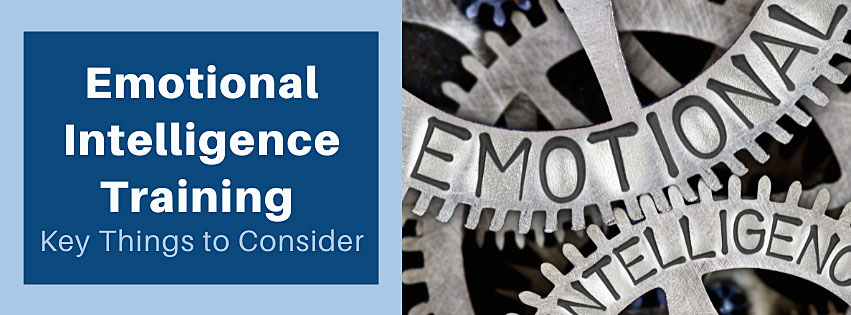
In this post, Laurie Warkentin provides some key insights on the importance of emotional intelligence (EI) training. She covers making the case for training, touches on what the 5 main EI competency areas are, and why an EI training workshop might be a good choice for your organization.
Making a Case for Emotional Intelligence Training
If you were to make a list of all the things that impact you, what kinds of things would be on that list? Think about all the things that you are concerned about and that directly or indirectly have an impact on you.
What’s on your list? The environment? Your job? The rise in the cost of living?
If I were to place a bet, I’d bet that there are at least some relationships on your list. Whether that is a personal or work relationship, our relationships impact us. Some more than others, some have positive benefits, and some relationships cause us stress or have negative impacts, but the truth is that relationships matter. Likely we all have relationships that have both positive benefits and negative impacts.
Covey’s Circle of Influence model, which we have written about before, can be a tool to help us maintain perspective and decide how and where we want to focus our energy. This can apply to our relationships and can be a powerful tool that I would encourage you to check out
Of course, we all aspire for all our relationships to be effective and meaningful, and yet for most of us, we can think of at least some relationships that we wish we could navigate better or improve. Some relationships are downright toxic, and hopefully we ourselves are not contributing to that toxicity. Whether in the workplace or in our personal lives, relationships have a huge impact on us. We all share the same need to connect, to be seen, be heard and we want to be understood.
There is a big distinction between what we can influence in relationships and what impacts us but we may not have much ability to change. I think one of the best tools to help us focus on what we do have influence over in relationships is Emotional Intelligence. A tool that I find most useful, especially in how we navigate in relationships. Sometimes Emotional Intelligence is referred to as EI or EQ (emotional quotient). The EI assessment tool we use in our Emotional Intelligence Training Workshop is called the EQi2.0.
5 Key Competency Areas of Emotional Intelligence
These are key competency areas to explore when using the emotional intelligence in your organization. If you choose Summit to guide you through our Emotional Intelligence Training Workshop, you will be led by a certified Emotional Intelligence facilitator. We will go into more details about these 5 competencies and how they impact relationships and decision making, but the 5 main competencies are:
1. Self-Awareness and the ways we see ourselves.
2. Self-Regulation and the ways we express ourselves.
3. Interpersonal relationships and how we engage with others.
4. How we make decisions.
5. How we manage stress.
The more aware we are in these five main areas, the better chance we have to improve how we interact not only in relationships with other people, but also within ourselves. Raising self awareness is a great first step, but it isn’t often enough to make sustainable and significant changes. Long term changes require action plans, accountability, potentially peer coaching and more which can be built into your program. Take into consideration whether you and your team have the time, resources and competency to implement an emotional intelligence training program internally or whether you should bring in someone externally like Summit.
More content on Leadership Development and Team Building: Team Assessment Tools. Top Tools to Choose and Use
| Workplace Culture 2021. Pushing the Reset Button
Five Reasons Why Your Team Can Benefit From an Emotional Intelligence Training Workshop
1. It builds relationships and trust: In receiving your EI report, there will be about 20 pages of information and suggestions of how you might interact with it or possible personal action steps. You will take a step back from the work tasks you might normally talk about and have meaningful conversations with your colleagues about how you interact with each other and consider action steps that each person wants to commit to in order to improve relationships with self and others on the team.
2. It raises not only self awareness, but team awareness: In learning about each other, this helps to grow understanding and empathy about where someone else is coming from. An increased sense of empathy and understanding for others is an important part of building relationships and trust.
3. It helps drive ongoing conversations: Make one meeting a month (or bi-monthly) a check in to see how team members are doing on their EI goals. This can cut through a lot of noise and business tasks and keep relationship check-ins and building relationships as an important part of keeping the team strong and feeling supported.
4. You can set personal goals together: You can choose to be accountable to other colleagues in personal or team EI growth goals and have prompts for important conversations about how that is going through doing EI together.
5. You can improve your work relationships which contributes to better mental health and feelings of support: When we feel listened to, understood and supported, it strengthens our resiliency and positively contributes to our mental health, sense of well-being and is a good way to build relationships in the team.
Need Some Help?
There’s a lot to consider when it comes to emotional intelligence training and we’re here to help. Contact us and talk with one of our team building experts and we’ll help you, your team and company pick a path focused on improving the performance and wellbeing.

